As businesses continue to adopt digital marketing strategies, marketing analytics tools have become increasingly important in tracking the success of marketing efforts. B2B businesses can benefit greatly from utilizing marketing analytics tools to analyze their marketing data and make informed decisions to drive business growth. For instance,
- According to a recent survey, businesses that utilize marketing analytics tools are 39% more likely to see an increase in their marketing ROI.
- The global marketing analytics market is expected to reach $6.9 billion by 2026.
- 32% of marketers cited marketing analytics and competitive intelligence as the most crucial factors supporting their marketing efforts.
Hence, the importance of marketing analytics cannot be overstated. So, if you’re looking for a tool that can help you enhance your performance, here’s a guide that can help. This article provides a comprehensive overview of the top marketing analytics tools available for B2B businesses. These tools help businesses measure their marketing campaigns' effectiveness, identify improvement areas, and make data-driven decisions.
Top Marketing Analytics Tools for Business Success
Marketing analytics tools are essential for businesses to track and analyze their marketing efforts and make data-driven decisions to optimize their ROI. From website traffic to social media engagement, these b2b marketing platforms comprehensively view customer behavior, preferences, and trends.
Some of the best marketing analytics tools for business success include:
1. Arena Calibrate
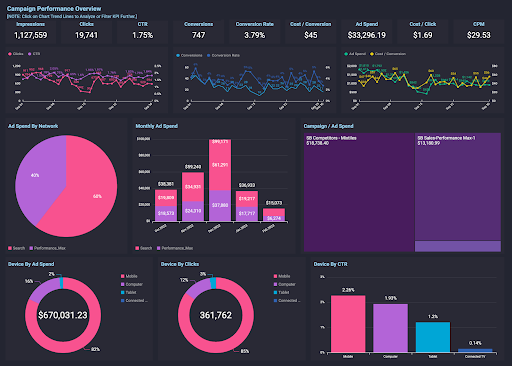
Arena is a powerful simulation tool that enables businesses to optimize their processes and improve decision-making. With its cloud-based platform and customizable plans, Arena is a flexible and scalable solution for businesses of all sizes and industries.
Unique Features
Arena Calibrate offers unique features such as automated calibration, model parameterization, and sensitivity analysis. With these features, users can calibrate models to real-world data and improve model accuracy.
Plan Details
Arena Calibrate offers a range of pricing plans based on the number of users, the number of models being calibrated, and the level of support required. Interested users can contact Arena directly to discuss their specific needs and receive a customized quote.
Additionally, Arena Calibrate offers a free trial period for new users to test out the tool and determine which plan works best for their organization.
2. Google Analytics
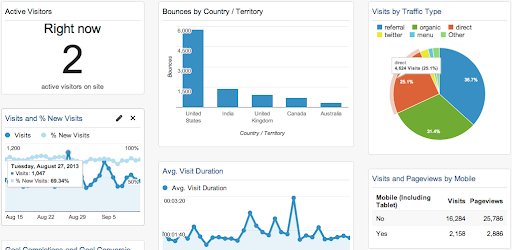
Google Analytics is a free web analytics tool that provides businesses with insights into their website traffic and user behavior. It tracks metrics such as page views, bounce rate, session duration, and conversion rate, allowing businesses to understand how users interact with their websites and identify opportunities for improvement.
Google Analytics also offers custom reports, dashboards, real-time reporting, and e-commerce tracking.
Unique Features
Google Analytics is one of the most widely used web analytics tools, providing businesses and website owners with a wealth of data to help them understand their audience and optimize their online presence. One key factor that sets Google Analytics apart from other best b2b marketing tools is its unique features.
Plan Details
Google Analytics offers a free version with basic features and a premium version called Google Analytics 360 that provides additional features such as data analysis and processing, cross-device and cross-platform reporting, and advanced audience segmentation.
The pricing for Google Analytics 360 is based on the volume of data and starts at $150,000 per year.
3. Hubspot

HubSpot is a popular marketing automation platform that includes a suite of tools for inbound marketing, sales, and customer service. The platform provides businesses with analytics tools for email marketing, social media, and website performance.
HubSpot also offers a CRM system that helps businesses manage customer interactions and track lead generation.
Unique Features
HubSpot is a comprehensive inbound marketing and sales platform that offers a wide range of tools and features to help businesses grow and succeed online. HubSpot offers an all-in-one platform that includes marketing, sales, and customer service tools, providing a seamless experience for users across all stages of the customer journey.
Plan Details
HubSpot offers a range of pricing plans, including a free version with basic features such as lead capture forms and email marketing. The paid plans range from $50 to $3,200 per month and include additional features such as advanced analytics, marketing automation workflows, and CRM integration.
HubSpot also offers a custom enterprise plan for businesses with more complex needs.
4. Adobe Analytics
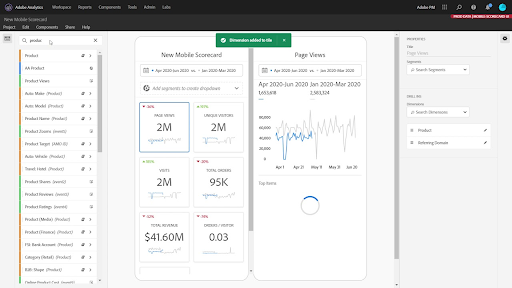
Adobe Analytics is a web analytics tool that provides businesses with insights into user behavior, marketing performance, and customer segmentation. It tracks metrics such as website traffic, conversion rates, and customer lifetime value, allowing businesses to understand how users interact with their websites and optimize their marketing campaigns accordingly.
Adobe Analytics also offers predictive analytics and audience segmentation, enabling businesses to deliver personalized experiences to their customers.
Unique Features
Adobe Analytics offers extensive data collection capabilities, allowing businesses to track virtually any data point they choose, including customer behavior, website interactions, and mobile app usage. This feature provides a more comprehensive view of the customer journey, enabling businesses to make more informed decisions based on accurate data.
Plan Details
Adobe Analytics offers a range of pricing plans based on the volume of data and the number of features required. The pricing starts at $30,000 per year for the standard plan and goes up to $150,000 per year for the premium plan.
Adobe also offers a custom enterprise plan for businesses with more complex needs.
5. MixPanel
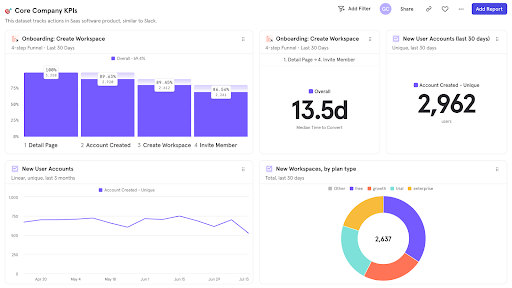
Mixpanel is a user analytics tool that provides businesses with insights into user behavior, engagement, and retention. It tracks user actions and events within a website or application, allowing businesses to understand how users interact with their products and identify opportunities for improvement.
Mixpanel also offers cohort analysis and retention reports, enabling businesses to track user behavior over time and measure the effectiveness of their retention strategies.
Unique Features
Mixpanel offers a powerful funnel analysis feature that allows businesses to track user behavior throughout their customer journey. This feature enables businesses to identify drop-off points, optimize their user experience, and improve overall customer engagement.
Plan Details
Mixpanel offers a range of pricing plans, including a free version with basic features such as 25,000 data points per month and 90 days of data retention. The paid plans start at $999 per year and include additional features such as unlimited data points, real-time data streaming, and A/B testing.
Mixpanel also offers a custom enterprise plan for businesses with more complex needs.
6. Whatagraph
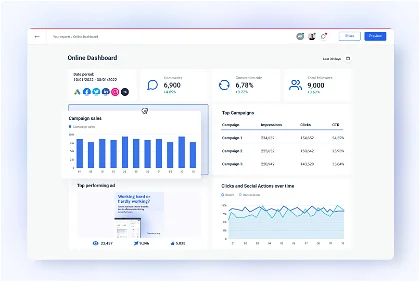
Whatagraph is a marketing reporting tool that allows businesses to create custom visual reports from multiple data sources. It integrates with popular marketing platforms such as Google Analytics, Facebook Ads, and Instagram, allowing businesses to combine data from different sources into a single report.
Whatagraph also offers automated report scheduling, enabling businesses to send reports to clients or team members on a regular basis.
Unique Features
Whatagraph is an online reporting and analytics tool that provides several unique features to help businesses better understand their data and make more informed decisions. Whatagraph offers a wide range of customizable report templates allowing businesses to create reports that fit their needs. This feature enables businesses to quickly and easily generate reports that provide actionable insights into their data.
Plan Details
Whatagraph offers a range of pricing plans, starting at $99 per month for the basic plan and going up to $599 per month for the agency plan. Each plan includes a set number of users, data sources, and report templates, with additional features available at higher price points.
Whatagraph also offers a custom enterprise plan for businesses with more complex needs.
7. SEMrush

SEMrush is a popular SEO and digital marketing tool that offers a wide range of features for keyword research, competitive analysis, and site audit.
Unique Features
SEMrush offers a suite of powerful digital marketing tools that provide businesses with insights into their competitors and help them optimize their online presence. Its keyword research, site audit, competitive analysis, content marketing, and advertising analysis features make it a unique and valuable tool for businesses looking to gain a competitive edge in the digital marketplace.
Plan Details
SEMrush offers a range of pricing plans, starting at $119.95 per month for the Pro plan and going up to $449.95 per month for the Business plan. Each plan includes a different level of features, including keyword research, site audit, competitor analysis, and social media tools, with additional features available at higher price points.
SEMrush also offers a custom enterprise plan for businesses with more complex needs.
8. BuzzSumo
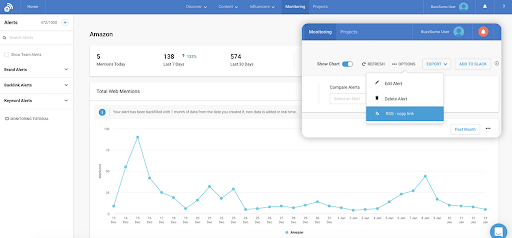
BuzzSumo is a content marketing tool that helps businesses analyze the performance of their content and identify popular topics in their industry. With BuzzSumo, businesses can track the performance of their content, identify trending topics, and discover potential influencers in their industry.
Unique Features
BuzzSumo offers a suite of powerful content marketing tools that provide businesses with insights into their content performance and their competitors' strategies.
Its content discovery, influencer marketing, content analysis, social media monitoring, and backlink analysis features make it a unique and valuable tool for businesses looking to improve their content marketing efforts.
Plan Details
BuzzSumo offers a range of pricing plans, starting at $99 per month for the Pro plan and going up to $499 per month for the Enterprise plan. Each plan includes different features, including content analysis, influencer identification, and topic research, with additional features available at higher price points.
BuzzSumo also offers a free trial and a custom enterprise plan for businesses with more complex needs.
9. AWeber
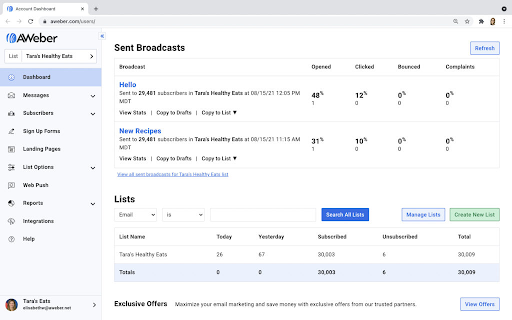
AWeber is an email marketing tool that allows businesses to create and send professional emails to their subscribers. With AWeber, businesses can automate their email campaigns, segment their audience, and track the performance of their emails.
Unique Features
AWeber offers a suite of powerful email marketing tools that provide businesses with the ability to create effective campaigns and engage with their subscribers. Its email automation, landing page builder, segmentation, integrations, and reporting and analytics features make it a unique and valuable tool for businesses looking to improve their email marketing efforts.
Plan Details
AWeber offers a range of pricing plans, starting at $19 per month for up to 500 subscribers and going up to $149 per month for up to 25,000 subscribers. Each plan includes different levels of features, including automation, segmentation, and analytics, with additional features available at higher price points. AWeber also offers a 30-day free trial for businesses to test out its platform.
10. Heap Analytics
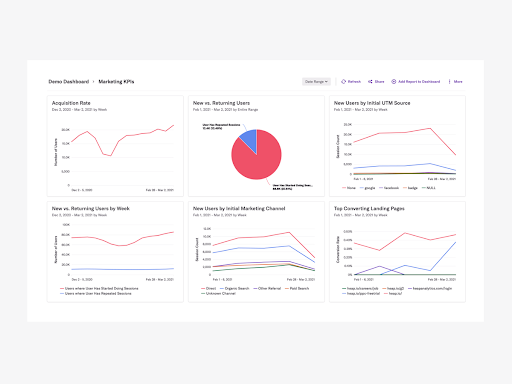
Heap Analytics is an analytics tool that enables businesses to track user behavior and analyze user data on their website or mobile app. With Heap Analytics, businesses can automatically capture every interaction users have with their website or app and analyze the data to gain insights into user behavior.
Unique Features
Heap Analytics provides businesses with comprehensive tools to analyze and optimize their website's performance. Its automatic event tracking, retroactive analysis, customizable dashboards, user-level data, and attribution modeling features make it a unique and valuable tool for businesses looking to improve their web analytics.
Plan Details
Heap Analytics offers a range of pricing plans, starting at $0 per month for the free plan and going up to custom pricing for the Enterprise plan.
Each plan includes different levels of features, including retroactive data collection, event tracking, and user behavior analysis, with additional features available at higher price points. Heap Analytics also offers a free trial and a custom pricing plan for businesses with more complex needs.
Importance of Marketing Analytics in B2B Business
Marketing analytics plays a crucial role in helping B2B businesses make data-driven decisions and improve their overall marketing strategies.
By collecting and analyzing data on customer behavior, market trends, and campaign performance, businesses can gain insights into what works and what doesn't and make informed decisions about where to invest their marketing resources.
This can help businesses optimize their marketing efforts, improve their ROI, and ultimately drive business growth.
Moreover, marketing analytics can help B2B businesses better understand their target audience. By analyzing customer data and behavior, businesses can identify their customers' needs, pain points, and preferences and tailor their marketing messages accordingly.
This can help businesses create more personalized and relevant marketing campaigns, which can increase customer engagement and loyalty. Ultimately, by leveraging the power of marketing analytics, B2B businesses can gain a competitive edge in the market, improve their customer acquisition and retention rates, and drive long-term business success.
Advantages of Utilizing Marketing Analytics
B2B marketing analytics provides several advantages for businesses, including optimizing marketing strategies, driving decisions with data, and enhancing customer experience through insights.
By leveraging marketing analysis tools, businesses can gain valuable insights into their customers' behavior, preferences, and needs, which can inform their marketing strategies and improve their overall performance.
Optimizing Marketing Strategies for Effectiveness
By analyzing campaign performance and customer behavior data, businesses can identify which marketing strategies are working and which are not. This can help them optimize their marketing efforts to improve effectiveness and maximize ROI. Marketing analytics can also help businesses identify new opportunities for growth and expansion and make data-driven decisions about where to invest their marketing resources.
Driving Marketing Decisions with Data
Marketing analytics provides businesses with a wealth of data and insights that can inform their marketing decisions. By analyzing customer data, market trends, and campaign performance, businesses can make informed decisions about which strategies to pursue and which to avoid. This can help them stay ahead of the competition and adapt to changing market conditions.
Enhancing Customer Experience through Insights
B2B marketing analytics can also help businesses improve the customer experience by providing insights into customer behavior, preferences, and needs. By understanding their customers better, businesses can tailor their marketing messages to be more personalized and relevant and provide a better overall experience.
This can help businesses build stronger customer relationships and increase customer loyalty over time.
Role of Marketing Analytics Tools in Driving Business Growth
Marketing analytics tools play a critical role in driving business growth by providing valuable insights into customer behavior, market trends, and the effectiveness of marketing strategies. Let's take a closer look at some of the ways marketing analysis tools can help businesses grow.
Empowering Product Intelligence
These types of B2B marketing tools provide businesses with valuable data on how customers interact with their products, including what features are used most frequently and how often. This information can help businesses identify which products are most popular with customers and which features need improvement or further development.
Understanding Customer Behavior
Digital marketing analytics tools can help businesses understand how customers interact with their websites, social media accounts, and other digital channels. This information can help businesses identify the most effective marketing channels, understand which campaigns are driving the most engagement, and adjust their strategies accordingly.
Optimizing Messaging Strategy
By analyzing customer data, marketing analytics platforms can help businesses optimize their messaging strategies by identifying which messages resonate most with their target audience. This information can help businesses create more effective campaigns and drive higher engagement rates.
Staying Ahead Competitively
Marketing analytics tools can help businesses stay ahead of the competition by providing insights into market trends and competitor activity. By monitoring industry trends and analyzing competitor data, businesses can identify new opportunities for growth and adjust their strategies to better compete in their market.
Discovering Trends and Opportunities
Marketing analytics tools can help businesses identify emerging trends and opportunities in their market. By monitoring consumer behavior and analyzing market data, businesses can identify new opportunities for growth and adjust their strategies accordingly.
Proving ROI with Analytics
Marketing analytics tools can help businesses measure the success of their marketing campaigns and provide insights into the return on investment (ROI) of their marketing spend. This information can help businesses make more informed decisions about where to allocate their marketing budget and which campaigns to prioritize.
Conclusion
In conclusion, marketing analytics tools are vital for B2B businesses to optimize their marketing strategies and drive business growth. With various options available, businesses can choose the best suits their needs and budget.
Understanding customer behavior, staying ahead of competitors, and discovering trends and opportunities to prove ROI with marketing analytics data is essential. We encourage businesses to utilize this analytical b2b marketing software to gain insights into the market and make data-driven decisions for their success.
FAQ on Marketing Analytics
What are the 5 categories of marketing analytic tools?
The 5 categories of marketing analytic tools are:
- Web Analytics Tools
- Social Media Analytics Tools
- Search Engine Analytics Tools
- Email Marketing Analytics Tools
- Customer Relationship Management (CRM) Analytics Tools
How do marketing analytics tools help in optimizing marketing strategies?
Marketing analytics tools help in optimizing marketing strategies by providing insights into consumer behavior, market trends, and performance metrics. By analyzing data on customer demographics, preferences, and behavior, businesses can better understand their target audience and tailor their marketing campaigns to their needs.
Additionally, marketing analytics tools can help businesses track the success of their marketing efforts by providing key performance indicators (KPIs) such as website traffic, conversion rates, and customer engagement metrics. With this information, businesses can make data-driven decisions to optimize their marketing strategies and improve their return on investment (ROI).
What are some of the best practices for successful marketing analytics tool implementation?
Here are some best practices for successful marketing analytics tool implementation:
- Clearly define your goals and metrics before implementing the tool.
- Ensure that you have the right people with the necessary skills and expertise to handle the tool and interpret the data it provides.
- Ensure that the tool is integrated with your other marketing and sales platforms for seamless data transfer and analysis.
- Regularly monitor and review the data provided by the tool to identify trends and areas for improvement.
- Continuously adjust your marketing strategies based on the insights provided by the tool.
- Develop a culture of data-driven decision-making within your organization.
- Provide ongoing training and support to your team to ensure they are proficient in using the tool and interpreting the data accurately.
What are some of the ethical considerations for businesses in marketing analytics?
There are several ethical considerations that businesses need to keep in mind when using marketing analytics tools. Some of these considerations include:
- Data privacy and security: Businesses need to ensure that they are collecting and using data in a responsible and ethical manner. This includes obtaining consent from customers before collecting their data and taking appropriate measures to secure the data.
- Transparency: Businesses should be transparent about what data they are collecting and how they are using it. Customers should have clear information about how their data is being used and the ability to opt-out if they choose.
- Fairness: Businesses should ensure that marketing analytics tools do not discriminate against any particular group or individual.
- Accuracy: Marketing analytics tools should be accurate and reliable, and businesses should take steps to verify the accuracy of their data.
- Responsiveness: Businesses should be responsive to customer concerns and complaints about their marketing analytics tools. They should have processes in place to address these concerns and take appropriate action if necessary.
What are some of the challenges while implementing marketing analytics tools in business?
There can be several challenges while implementing marketing analytics tools in a business, including:
- Data Quality: The quality of data used by marketing analytics tools is crucial, and accurate or complete data can lead to unreliable insights.
- Integration with existing systems: Integration of marketing analytics tools with existing business systems such as CRMs can be challenging and may require technical expertise.
- Cost: Implementing marketing analytics tools can be expensive, and businesses may need to consider the cost-benefit analysis before making a decision.
- Talent and skills: Effective use of marketing analytics tools requires skilled personnel with expertise in data analysis, statistics, and marketing.
- Privacy and data protection: Marketing analytics tools collect and use consumer data, which can raise privacy concerns. Businesses need to ensure compliance with data protection regulations and ethical practices.
- Resistance to change: Implementing marketing analytics tools can bring changes to existing business processes and workflows, which may face resistance from employees or stakeholders.
Addressing these challenges requires careful planning, communication, and collaboration between the business, IT, and marketing teams and a commitment to continuous improvement and training.




